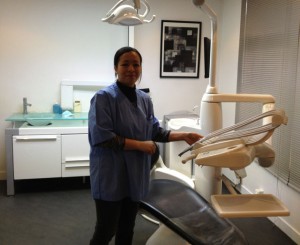I was sitting in the dentist’s chair today thinking about the word piqûre as the needle sank slowly and painlessly into my gums (that is why I am willing to go across Paris to see my dentist!). Although injection is the correct term, it is very rarely used.

Piqûre comes from the verb piquer from the low Latin pikkare (1306) meaning to prick and exists in all the Romance languages except Romanian, which is quite astonishing. In English, we can call an injection a “shot” or “jab” but they are much more informal than piqûre.
A few examples of the way in which piqûre is used:
Le médecin m’a fait une piqure: The doctor gave me an injection.
Il s’est fait une injection d’insuline: He injected himself with insulin.
Une piqure de rappel is a booster shot.
Piqûre can also have an entirely different meaning – a mosquito or insect bite or a bee or nettle sting. It’s funny that English should be so precise, isn’t it? The mosquito actually bites us like a dog and the bee stings us like a nettle.
A pinprick is a piqûre d’épingle while the actual hole formed when the needle goes into the skin is a piqûre as well.
Interestingly, piquer doesn’t only mean prick – it also means to sew or stitch; the result – the line of stitching – is also a piqûre. Piquer à la machine is to machine stitch. If someone asks me “Sais-tu piquer à la machine” they are asking if I know how to use a sewing machine (which I do).
There are lots of other expressions using piquer. I’m sure you can suggest a few!

Hi Rosemary you have a talent for picking up interesting words…
– Piquer/une piqûre, as you said, had to do with “making a hole” (or trying to…) with a sharp intrument like a needle, or a sword/knife’s point.
-Injecter/une injection is to introduce a fluid into something (to inject), that doesn’t necessarily requires “une piqûre”.
So obviously at the dentist “on te pique pour t’injecter (something)”, and -obviously too- if a doctor/nurse jabs you it’s not to hurt but to inject something… That’s why we use piquer…. il also is a very simple word that kids learn well before understanding what an injection is… So we know the word from a very young age, and we know it hurts 🙂 so looks like we know enough about it….
As to the english being “so precise” I have my doubts 🙂 do the English really believe a
mosquito has teeth like a dog has?
A dog “mord” because it has teeth and a mosquito “pique” because it has a stinger…
While being at that it is said that “mosquitoes are blood-eating pests”… Eating? in french for a liquid -like blood is- we use “drinking”… or “feeding” to indicate the liquid is used as a food… Being precise in a language doesn’ necessarily mean you are in another one… We all know that!
Expressions with “piquer” maybe I can give your readers a few without giving the explanations, only a little context, so that they can have some fun too…
– Il m’a piqué ma veste/ma copine/mon vélo
– Je me suis piqué au jeu
– Ce vin est piqué on dirait du vinaigre.
– J’ai joué l’as de pique et j’ai fait la levée (Bridge/trick)
– Il est complètement piqué ce garçon, il a sauté dans la piscine tout habillé !
– Il se pique de bien connaître l’Angleterre.
– Cette histoire ne manque pas de piquant…
Bonne journée à tous !
Thank you for your long comment Ago and all your examples of “piquer”. “Prick” in English is exactly “piquer” in the sense of making a small hole in something with something sharp, but it’s use is more more limited than the French “piquer”.
By precision I meant that it was interesting that English should have a separate verb for two similar actions.